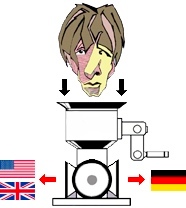| Pages in topic: < [1 2 3 4] > | Has using DeepL become the norm? How to calculate PEs? Thread poster: dieuebersetzung
|
|---|
Adieu 
Ukrainian to English
+ ...
I am not sure if you are aware, but DeepL is far from the only such system. For many language pairs, it is actually on the iffy end of the spectrum of available choices.
Also, properly done MTPE can NOT, at this point in time, be discounted 50% or more. That's the "WE ACCEPT UTTER CRAP AND SAY MMM MMM GOOD ANYWAY" rate for MTPE.
By the way, I get the feeling that much of the shift to official MTPE is based on the belief that "they'll do it anyway".
If you ... See more I am not sure if you are aware, but DeepL is far from the only such system. For many language pairs, it is actually on the iffy end of the spectrum of available choices.
Also, properly done MTPE can NOT, at this point in time, be discounted 50% or more. That's the "WE ACCEPT UTTER CRAP AND SAY MMM MMM GOOD ANYWAY" rate for MTPE.
By the way, I get the feeling that much of the shift to official MTPE is based on the belief that "they'll do it anyway".
If you decide to get on that bandwagon, you yourself must supply the pre-translation, and you will need to pay 75-80+% of your previous translation rates if you wish to demand any kind of quality standards from your freelancers.
Attempts to pay 50% lead to burnout, frustration, and then the inevitable meh-whatever-screw-this-CTRL-ENTER approach to (not) editing MT segments. ▲ Collapse
| | | | Edward Potter 
Spain
Local time: 09:10
Member (2003)
Spanish to English
+ ...
The only way to actually reduce the workload of the translator is to expressly ask them not to do their original translation process described above, and simply proofread the MT result instead, ignoring the source text except if the MT output makes no sense.
That is the way I work when doing post editing. I largely ignore the source (unless the target makes no sense), and treat it as a proofreading job.
My main customer for post editing understands all of the issues you mention. I'm good with the situation.
| | | | Kristina Love 
United States
Local time: 03:10
Spanish to English
+ ...
This discussion has been a real eye-opener for me as someone new to the profession.
I don't think there's any question that what the OP experienced, just as he described it (and I do not get the impression that he is mistaken or exaggerating), was very unprofessional, lazy, sloppy work at best and fraud at worst. If DeepL was utilized for the translation and only 10% of it was edited to make it different, there is simply no way in the world that a quality translation was produced. ... See more This discussion has been a real eye-opener for me as someone new to the profession.
I don't think there's any question that what the OP experienced, just as he described it (and I do not get the impression that he is mistaken or exaggerating), was very unprofessional, lazy, sloppy work at best and fraud at worst. If DeepL was utilized for the translation and only 10% of it was edited to make it different, there is simply no way in the world that a quality translation was produced. That is to say, it might turn out "OK" for some practical purposes, but that doesn't really matter. What the client is paying for (whether the translator charges a low rate or a high rate) is the translator's very best effort to produce the highest quality translation that they personally can possibly render.
However, I'm with the people who say that as long as the translation is of high quality (and I would add, that it is of the highest quality that the translator in question is capable of producing, giving sufficient time, attention, and care to their work), it shouldn't matter which tools they used along the way.
I think the OP has very valid reason to feel cheated in this instance. For me it's a shocking story, because it sounds like these were translators who were not just some fly-by-night "randos" but rather people he had trusted in the past, or at least who had proven years of experience as well as excellent marketing, and possibly other impressive credentials. This is not what I expected to hear, and I now realize I need to adjust my view of the people who appear to be the "ideal" translators and seem to have it all. I guess all that glitters is not gold.
Maybe these were well-intentioned people who mismanaged their time by mistake and took on too many jobs at once and found themselves in a very unfortunate predicament that sadly led to some corner-cutting and ethical compromises. We don't know what is going on with them - did they get greedy accept too much work, or were they experiencing dire financial problems? I don't want to judge them, but what they did, they shouldn't have done, and should never repeat it.
This thread has revealed that there isn't much agreement about how editing and MTPE rates, or translating with memory tools, or translating with the assistance of machine translation, or with CAT tools, should be priced.
Adieu and others already pointed this out, but I feel it really needs to be stressed: I think the OP has a few misconceptions of all the differences between these scenarios and what kind of work goes into each one. Is the OP a translator himself in addition to being/working for an agency?
It's so important to be knowledgeable about this and to have clear communication and mutual understanding between client and translator before the project starts. I recommend Corinne McKay's book "How to Succeed as a Freelance Translator."
A CAT tool, or translation environment tool, can be used with or without translation memory (not the same as machine translation), and with or without machine translation. And of course translations can be carried out without a CAT tool. In addition, as I believe a few others pointed out, Machine Translation Post-Editing is when the client gives the translator a project that has already been translated by a machine and then the translator "fixes it." If any kind of editing is done, it needs to be specified and agreed on: will the translator be editing a translation by looking at both source and target, or just the target? And will extensive revisions be necessary, or is it something that is practically ready and just needs to be proofread for minor mechanical errors?
Corinne McKay's book says that in general, the price charged for editing should be about a quarter to a third of what is charged for translating. I want to follow all of the advice in that book, but this one is a little difficult for me as I can see how "editing" is a broad term and may involve work that is almost or just as hard as translating.
I don't think there is anything wrong with using any and all tools. They can be used wisely, or they can be misused. Not wanting a translator to use a particular tool can somewhat be compared to insisting that they not use dictionaries or reference books, or insisting that they write it by hand instead of type. It may sound silly but it's the same principle. The tools are there to help create the best final product possible. With a difficult or lengthy project, I have noticed that using MT can even act as insurance against my own mistakes. If the machine suggests something I don't expect, it jumps out and catches my attention, and then I can focus in on determining whether it's the machine or my own understanding that's at fault. And yes, it DOES save time, but let's be clear: I'd probably spend a whole 7 days at least on a 50 page project even with MT. As a matter of fact, for any project, I'd use all the time that I had left until the deadline, regardless of what tools I was using, because the goal is to make it the absolute best it is within my power to make it. Every word of every sentence needs to be second- and triple- and quadruple-guessed, and more if time allows. The time that MT saves is time that can be re-invested back into refining the project and making it even better. At least 80% of the words need to be either reformulated or require time to research and confirm.
Some projects may be easier than that, and some translators may be faster and more efficient with this with more experience, but it doesn't change the basic fact that an honest and diligent translator with any kind of work ethic is going to spend a lot of time and effort on a translation, no matter what tools they do or don't use.
And it goes without saying this doesn't mean that translators don't have the right to rest, take care of themselves, have a personal life, or insist on a rate that they consider fair and worth their time and effort. ▲ Collapse
| | | |
Edward Potter quotes/wrote:
The only way to actually reduce the workload of the translator is to expressly ask them not to do their original translation process described above, and simply proofread the MT result instead, ignoring the source text except if the MT output makes no sense.
That is the way I work when doing post editing. I largely ignore the source (unless the target makes no sense), and treat it as a proofreading job. My main customer for post editing understands all of the issues you mention. I'm good with the situation.
The thing is, that even a target segment that describes exactly the opposite of the source, can sound valid. E.g. because modifiers like ‘not’, related words like ‘left’, ‘right’, ‘open’, ‘close’ etc. (especially when they occur together in the source) are often left out or swapped. There is no way (not even via QA) to detect these dangerous errors, that can cause damage and injuries, except reading the source.
[Edited at 2021-07-18 07:22 GMT]
| | |
|
|
|
| active and passive vocabulary - MT accesses words in the submerged part of the iceberg in my brain | Jul 18, 2021 |
As I said before, I am an occasional translator and work only in a field of which I have personal knowledge (education). If the translation I do in this field has, say, a legal or commercial slant as opposed to a pedagogical or didactic one, I find that using some type of MT helps me by providing terms that are not in my active vocabulary.
For example a text mentions payment details or legal regulations. The MT will come up with terms that are in my passive as opposed to active vocabulary... See more As I said before, I am an occasional translator and work only in a field of which I have personal knowledge (education). If the translation I do in this field has, say, a legal or commercial slant as opposed to a pedagogical or didactic one, I find that using some type of MT helps me by providing terms that are not in my active vocabulary.
For example a text mentions payment details or legal regulations. The MT will come up with terms that are in my passive as opposed to active vocabulary (the contract is concluded, a billing address, just to give you some simple examples). I immediately recognise that these are the right terms but might not have arrived at them just by thinking about it. So here the MT replaces using a normal dictionary but is much faster, and I think this is legitimate.
I often think of the image of an iceberg for a person's vocabulary. The part sticking up out of the water is what I can resource immediately. The other 8/9 parts are deeper in my memory and words down there need pulling up to the surface before they can be used.
Possibly translators have a larger iceberg than other people, rather than one where more sticks out of the water?? ▲ Collapse
| | | | | I know what you mean... | Jul 18, 2021 |
British Diana wrote:
As I said before, I am an occasional translator and work only in a field of which I have personal knowledge (education). If the translation I do in this field has, say, a legal or commercial slant as opposed to a pedagogical or didactic one, I find that using some type of MT helps me by providing terms that are not in my active vocabulary.
For example a text mentions payment details or legal regulations. The MT will come up with terms that are in my passive as opposed to active vocabulary (the contract is concluded, a billing address, just to give you some simple examples). I immediately recognise that these are the right terms but might not have arrived at them just by thinking about it. So here the MT replaces using a normal dictionary but is much faster, and I think this is legitimate.
I often think of the image of an iceberg for a person's vocabulary. The part sticking up out of the water is what I can resource immediately. The other 8/9 parts are deeper in my memory and words down there need pulling up to the surface before they can be used.
Possibly translators have a larger iceberg than other people, rather than one where more sticks out of the water??
but if the right term is only in your passive vocabulary, it clearly means that you are not an expert in the given field, so it s kind of a superficial knowledge that even MT can fake. Without MT, you would have to look up every term in the dictionary just as a beginner does.
[Modifié le 2021-07-18 12:01 GMT]
| | | |
Kristina Love wrote:
It's so important to be knowledgeable about this and to have clear communication and mutual understanding between client and translator before the project starts. I recommend Corinne McKay's book "How to Succeed as a Freelance Translator."
A CAT tool, or translation environment tool, can be used with or without translation memory (not the same as machine translation), and with or without machine translation. And of course translations can be carried out without a CAT tool. In addition, as I believe a few others pointed out, Machine Translation Post-Editing is when the client gives the translator a project that has already been translated by a machine and then the translator "fixes it." If any kind of editing is done, it needs to be specified and agreed on: will the translator be editing a translation by looking at both source and target, or just the target? And will extensive revisions be necessary, or is it something that is practically ready and just needs to be proofread for minor mechanical errors?
Corinne McKay's book says that in general, the price charged for editing should be about a quarter to a third of what is charged for translating. I want to follow all of the advice in that book, but this one is a little difficult for me as I can see how "editing" is a broad term and may involve work that is almost or just as hard as translating.
I don't think there is anything wrong with using any and all tools. They can be used wisely, or they can be misused. Not wanting a translator to use a particular tool can somewhat be compared to insisting that they not use dictionaries or reference books, or insisting that they write it by hand instead of type. It may sound silly but it's the same principle. The tools are there to help create the best final product possible. With a difficult or lengthy project, I have noticed that using MT can even act as insurance against my own mistakes. If the machine suggests something I don't expect, it jumps out and catches my attention, and then I can focus in on determining whether it's the machine or my own understanding that's at fault. And yes, it DOES save time, but let's be clear: I'd probably spend a whole 7 days at least on a 50 page project even with MT. As a matter of fact, for any project, I'd use all the time that I had left until the deadline, regardless of what tools I was using, because the goal is to make it the absolute best it is within my power to make it. Every word of every sentence needs to be second- and triple- and quadruple-guessed, and more if time allows. The time that MT saves is time that can be re-invested back into refining the project and making it even better. At least 80% of the words need to be either reformulated or require time to research and confirm.
Some projects may be easier than that, and some translators may be faster and more efficient with this with more experience, but it doesn't change the basic fact that an honest and diligent translator with any kind of work ethic is going to spend a lot of time and effort on a translation, no matter what tools they do or don't use.
And it goes without saying this doesn't mean that translators don't have the right to rest, take care of themselves, have a personal life, or insist on a rate that they consider fair and worth their time and effort.
Thank you for your input.
Yes, I a also a translator and a proofreader. Of course it's not easy, no, it's impossible to give a fair rate for such work, as there are so many variables. Proofreading is the best example: I know many professionals who charge a fixed rate for that kind of work, yet there are texts that barely need touching and then there are texts that need to be rewritten entirely.
Also I have no problem whatsoever with TM, on the contrary. That goes without saying.
As you have mentioned yourself, this is just about people who just copy-paste a text into the free version of DeepL and then change it a little to correct mistakes (depending on the sort of text there are sometimes none) and disguise the origin. That's what I was really shocked to see people doing who are not open about it and charge the same as for a humans translation.
That was my point and I still see it that way.
| | | | Edward Potter 
Spain
Local time: 09:10
Member (2003)
Spanish to English
+ ...
Hans Lenting wrote: Edward Potter quotes/wrote:
The only way to actually reduce the workload of the translator is to expressly ask them not to do their original translation process described above, and simply proofread the MT result instead, ignoring the source text except if the MT output makes no sense.
That is the way I work when doing post editing. I largely ignore the source (unless the target makes no sense), and treat it as a proofreading job. My main customer for post editing understands all of the issues you mention. I'm good with the situation. The thing is, that even a target segment that describes exactly the opposite of the source, can sound valid. E.g. because modifiers like ‘not’, related words like ‘left’, ‘right’, ‘open’, ‘close’ etc. (especially when they occur together in the source) are often left out or swapped. There is no way (not even via QA) to detect these dangerous errors, that can cause damage and injuries, except reading the source. [Edited at 2021-07-18 07:22 GMT]
Of course hastily done MT editing is going to be less accurate than a human translation with lots of time to get it done. You work with the caveat that this will not be a polished translation with tons of time dedicated to producing a beautiful work of art.
It is not a good idea to run a 50k nuclear facility safety manual or step-by-step heart operation instructions through an MT, hand it over to your guy, and demand a turnaround of 24 hours. No, not a good idea.
However, in my case, my jobs aren't that critical. The end client fully understand how the job is being done and needs the dang thing tomorrow at 8 a.m. come heck or high water and knows that some things may not be intelligible or inaccurate - but much better than the raw machine text.
[Edited at 2021-07-18 13:57 GMT]
| | |
|
|
|
marlene Le Duc (X)
France
Local time: 09:10
English to French
| I do use DeepL Pro API | Jul 18, 2021 |
hello everyone,
I shall admit that I do use DeepL Pro API on my cattool, for several reasons.
1 I suffer from hemiparesia, so typing is quite difficult and fastidious.
2 I do see DeepL Pro API, like another tool : when I prepare my new project I charge in the files of this project all the former translation memories and glossaries that could help me with this new one.
Using DeepL Pro API doesn't mean that I just accept what it suggests, I do work on each sen... See more hello everyone,
I shall admit that I do use DeepL Pro API on my cattool, for several reasons.
1 I suffer from hemiparesia, so typing is quite difficult and fastidious.
2 I do see DeepL Pro API, like another tool : when I prepare my new project I charge in the files of this project all the former translation memories and glossaries that could help me with this new one.
Using DeepL Pro API doesn't mean that I just accept what it suggests, I do work on each sentence, looking for non-sens, for more accurate vocabulary, puns or jokes are often mistranslated.
I mean when you're cooking don't you use some electric stuff, like Kenwood Chef, or a Thermomix. If you ask for a tailor-made suit, will you ask to the tailor not to use a sewing machine? I bet you won't.
You don't use anymore paperback dictionnaries, everybody is using cattools, and computers.
DeePL Pro isn't the problem, The real problem is that some translators won't even check the MT, and accept really low rates because they run a MT and deliver straight away, they can undertake more jobs ruining by this behaviour all the industry ▲ Collapse
| | | |
David GAY wrote:
....but if the right term is only in your passive vocabulary, it clearly means that you are not an expert in the given field, so it s kind of a superficial knowledge that even MT can fake. Without MT, you would have to look up every term in the dictionary just as a beginner does.
[Modifié le 2021-07-18 12:01 GMT]
Exactly right, I am not an expert in the field but I can recognise the vocabulary when I hear it. It's like going to the doctor and getting told what is wrong with one in medical language. I understand everything but could not use this kind of language fluently and effortlessly myself. That's why I think the distinction active/passive vocabulary helps to justify using DeepL.
| | | | Adieu 
Ukrainian to English
+ ...
| But that's the beauty of it! | Jul 18, 2021 |
If our competitors weren't so prone to cheating, cutting corners, delivering crap, and blowing deadlines, then we would all be done.
Or emigrating to Kenya for third-world cost of living with reliable internet.
The solution is simple: PAY WELL. Make contractors aware that you offer a lucrative ongoing relationship that they don't want to burn by scamming you or delivering half-baked crap.
| | | | Stepan Konev 
Russian Federation
Local time: 10:10
English to Russian
| What does "half-baked crap" have to do with MT? | Jul 18, 2021 |
I can't understand why do you equate poor quality and machine translation...
If the result is perfect, who cares what tools they used, how they delivered it, how much time it took? It is perfect.
And again, if the result is shitty, who cares what tools they used, how they delivered it, how much time it took? It is shitty.
Adieu, here is an exercise for you.
Original: In the case of unavailability of any item, we reserve the right to substitute an item of equal or greater... See more I can't understand why do you equate poor quality and machine translation...
If the result is perfect, who cares what tools they used, how they delivered it, how much time it took? It is perfect.
And again, if the result is shitty, who cares what tools they used, how they delivered it, how much time it took? It is shitty.
Adieu, here is an exercise for you.
Original: In the case of unavailability of any item, we reserve the right to substitute an item of equal or greater value.
DeepL translation: В случае отсутствия какого-либо товара мы оставляем за собой право заменить его товаром равной или большей стоимости.
Can you provide your translation that is drastically better than that of DeepL please? ▲ Collapse
| | |
|
|
|
Adieu 
Ukrainian to English
+ ...
| I actually don't | Jul 19, 2021 |
I made $2k off MTPE this week. And hey, no carpal tunnel syndrome!
PS however, I didn't cut corners or confirm junk segments out of laziness. And it was billed as MTPE already, so no moral ambiguities or misunderstandings here.
Stepan Konev wrote:
I can't understand why do you equate poor quality and machine translation...
If the result is perfect, who cares what tools they used, how they delivered it, how much time it took? It is perfect.
And again, if the result is shitty, who cares what tools they used, how they delivered it, how much time it took? It is shitty.
Adieu, here is an exercise for you.
Original: In the case of unavailability of any item, we reserve the right to substitute an item of equal or greater value.
DeepL translation: В случае отсутствия какого-либо товара мы оставляем за собой право заменить его товаром равной или большей стоимости.
Can you provide your translation that is drastically better than that of DeepL please?
[Edited at 2021-07-19 00:34 GMT]
| | | | Stepan Konev 
Russian Federation
Local time: 10:10
English to Russian
| This completes the proof | Jul 19, 2021 |
You can't improve it because it is already of human quality. Any further improvement would make it worse. Why on earth clients might "feel cheated" just because I use a tool? Do you all feel cheated when builders use modern machinery and electronic equipment, instead of horses, bulls and slaves, to build your houses? All those estimates like 10%, 50%, 80%, any % and "MTPE only saves time if you accept lower quality" expressed above by fellow translators are just their own experience. But they ex... See more You can't improve it because it is already of human quality. Any further improvement would make it worse. Why on earth clients might "feel cheated" just because I use a tool? Do you all feel cheated when builders use modern machinery and electronic equipment, instead of horses, bulls and slaves, to build your houses? All those estimates like 10%, 50%, 80%, any % and "MTPE only saves time if you accept lower quality" expressed above by fellow translators are just their own experience. But they extend it to others in their infinite wisdom. That sound odd to me. ▲ Collapse
| | | |
British Diana wrote:
I find that using some type of MT helps me by providing terms that are not in my active vocabulary.
I’d even broaden this to style. I can really enjoy an elegant phrase that another translator has created and that comes to me via the harvesting of DeepL et al. I add these nice phrases to my glossary, for future, active use. So I actually learn from using MT. Even after 32 years.
| | | | | Pages in topic: < [1 2 3 4] > | There is no moderator assigned specifically to this forum. To report site rules violations or get help, please contact site staff » Has using DeepL become the norm? How to calculate PEs? | Trados Business Manager Lite | Create customer quotes and invoices from within Trados Studio
Trados Business Manager Lite helps to simplify and speed up some of the daily tasks, such as invoicing and reporting, associated with running your freelance translation business.
More info » |
| | Wordfast Pro | Translation Memory Software for Any Platform
Exclusive discount for ProZ.com users!
Save over 13% when purchasing Wordfast Pro through ProZ.com. Wordfast is the world's #1 provider of platform-independent Translation Memory software. Consistently ranked the most user-friendly and highest value
Buy now! » |
|
| | | | X Sign in to your ProZ.com account... | | | | | |
































